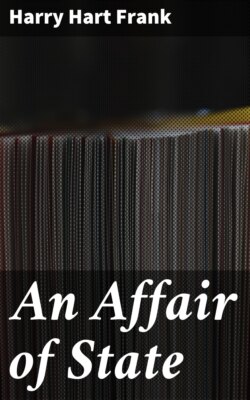Читать книгу An Affair of State - Harry Hart Frank - Страница 24
На сайте Литреса книга снята с продажи.
2
ОглавлениеTable of Contents
Jeff found Horace Locke on the second floor of Old State, across the street from the White House. The Department, in return for New War, had ceded Old State to the Presidential special agencies, so Horace Locke’s office was like a forgotten island around which eddied and bubbled the activity of a foreign sea. On the office door hung a sign—“Adviser to the Diplomatic Monuments and Memorials Commission.”
There was no anteroom, no secretary, no typists or messengers. There was only a thin, wispy, white-haired man, dressed in tweeds that were soft and silky with years, small in his loneliness. On his desk was the minimum issue, for one of Career Minister rank, of double pen set, water flask and glasses, metal calendar, two telephones, and in and out files, empty.
Jeff had expected he would be infirm, or dull-witted or cantankerous with age, but actually he didn’t appear so old. He certainly wasn’t any older than the Secretary of State, and he didn’t seem much older than Dannenberg or Matson. His manner was composed and yet alert, his handshake quick and steady. “You’re Baker, eh? Your father was Nicholas Baker, isn’t that right?” he began.
“That’s right, sir,” Jeff said.
“I thought so. Didn’t think there would be two Jefferson Wilson Bakers. Can you pull up one of those leather chairs? Don’t know whether they’re comfortable or not. Nobody ever sits in them.” He waited until Jeff moved the chair, and then he said, “How proud your father would have been—how very proud! Guess I’ll have to be proud for him. We were good friends, you know.”
“I’ve heard him speak of you quite often.”
“It was only luck that I knew you’d made the Foreign Service. Saw your name this morning in the Department bulletin. That’s all that ever crosses my desk, now, the daily bulletin.”
Jeff knew he should say something, but he was afraid that whatever he said would be wrong. Horace Locke was obviously in an uncomfortable position, and perhaps it would embarrass him to refer to it.
For a moment Horace Locke remained silent, too, although his clear gray eyes were inspecting Jeff, drinking in detail, analyzing, judging. “If I had known sooner,” he said, “there are some things I could have—.” He shook his head. “No, I couldn’t have been of any help to you. Sometimes I forget I’m no longer a Division Chief. Anyway, you did all right for yourself. You’re an FSO, Class V, and you’re going to Budapest. That’s good. What’s your job going to be?”
“I don’t know, exactly. I’ll be one of the Third Secretaries.”
They talked of Jeff’s father. The way Horace Locke talked, Nicholas Baker had been much more influential, in the Department, than Jeff had ever guessed. Jeff remarked about this, and Locke said:
“Don’t underestimate your own importance. Foreign policy is not made by speeches, or treaties, or directives, or proclamations. It is made by men, and what they do. That’s why I stay in the Department. I’ve got too big a stake in the Twentieth Century to pick up my chips and get out. Some day I might be able to do something again.”
Jeff said, “I did something once.”
“What’s that you said?”
“Oh, nothing,” Jeff said.
